A critical look at Master Quality Authenticating and why people are so upset.
A recent video published (on April 15, 2021) by GoldenSound has once again stirred up the MQA pot. In the last couple of weeks, the video made the rounds (again, and again) through most audiophile groups, and, as of writing, has racked up about 150,000 views. Additionally TIDAL (the main distributor of MQA) has announced a new tiered price plan in Australia that is expected to roll out worldwide. The audio hobbyist communities are in a buzz.
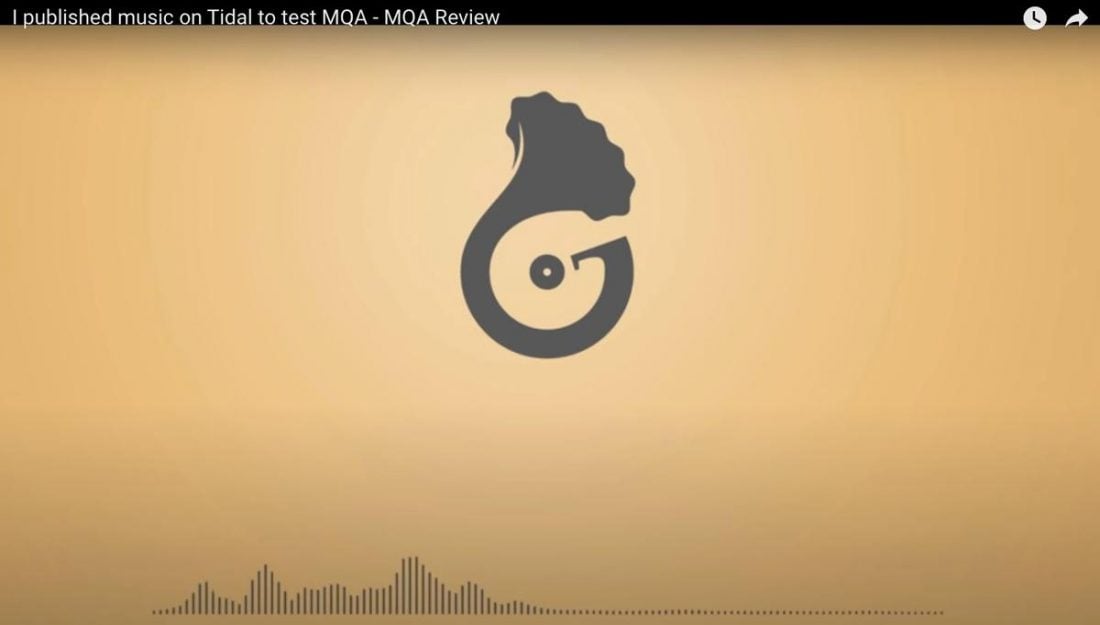
If you are an audio enthusiast, you are undoubtedly at least peripherally aware of MQA, but unless you’ve taken a deep dive, you may be wondering what all the fuss is about.
Master Quality Authenticated (MQA) was publicly launched in 2015 and has been caught up in controversy since its inception. MQA is the creation of Meridian Audio (and now MQA Ltd.) company founder Bob Stuart and long-term collaborator Peter Craven. MQA is a new approach to high-resolution digital audio encoding and reproduction, focusing on the time domain, rather than the more common strategy of increasing bit depth and sample rate.
MQA involves using a proprietary lossy compression technique to ‘fold’ (their term) an audio file into a lossless (FLAC) container, primarily intended to reduce its size for streaming. MQA certified hardware or software is required on the end user’s side to ‘unfold’ the file for playback.
Unsurprisingly, a big part of the controversy comes from the use of a lossy format to deliver the claimed highest-fidelity audio experience. This stands in stark contrast to the near-ubiquitous ‘lossless is best’ philosophy in audio.
From the consumer’s point of view, what is most obviously important? Simply, does MQA deliver the highest possible sound quality? Seems easy enough. Shouldn’t that at least be clear?
I’m afraid not.
What Is MQA?

To understand the controversy around MQA, we need to have a basic understanding of what Master Quality Authenticated is all about. A ton has been written on the subject, and if anything is consistent between it all, it’s that the MQA process isn’t easy to describe or understand.
Unfortunately, the MQA corporation itself hasn’t made it any easier for consumers. Their documentation uses proprietary terms, jargon, and unmeasurable claims. And if there’s something that gets the audiophile community riled up, it’s when they think there is a whiff of ‘snake oil’ in the air.
Pulling a fast one, eh?
Sadly, the lack of transparency does MQA a disservice. It’s entirely possible it delivers on all its promises, but they don’t clearly explain how they achieve it.
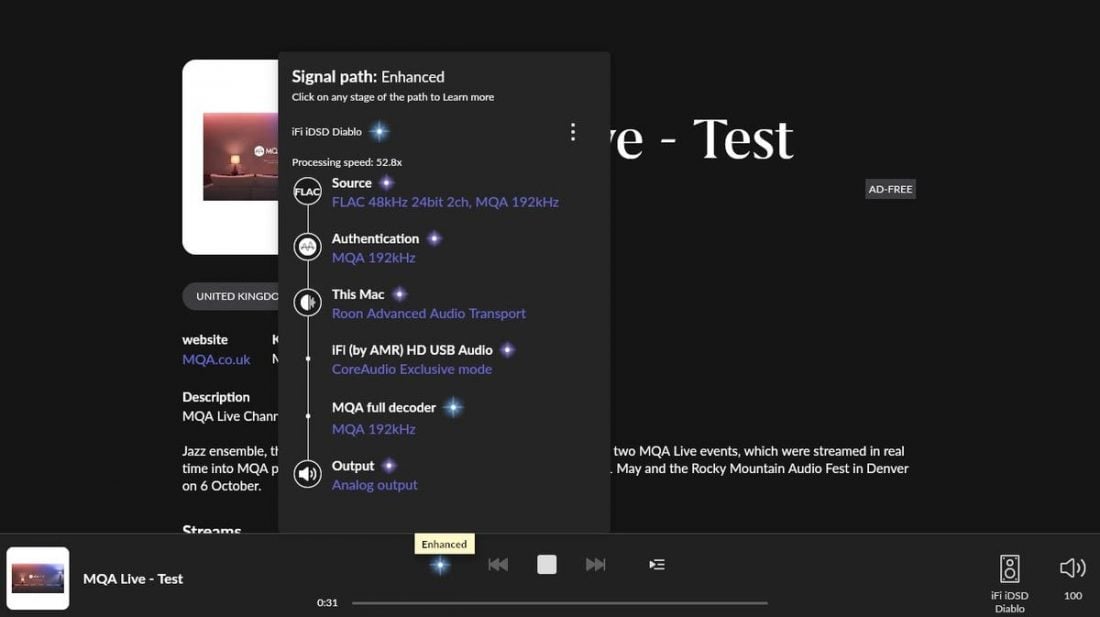
What Does MQA Do to Music?
MQA takes original high-resolution studio recordings and ‘folds’ (compresses) them through a multi-step process and stores them in a 44.1kHz or 48kHz container file. The sample rate of the original file determines the resulting sample rate of the container file.
The MQA encapsulation procedure takes the original hi-res content and, through their proprietary encoding process, compresses and stores the high-frequency bands as data, and embeds it into the lower frequency bands.
The MQA encode process
- MQA Encoding Process: Original file → Folding Steps → MQA container file
- 2-Step Encoding: Original file = 192kHz → 96kHz → 48kHz = MQA container file
- 3-Step Encoding: Original file = 352.6kHz → 176.4kHz → 88.2kHz → 44.1kHz = MQA container file
Now the standard 20Hz-20kHz audio portion can be played back on any DAC or the additional information (ultrasonic content) can be unfolded by an MQA certified device and added back into the file for high-resolution playback.
The 3-step MQA decode process – music origami
- An MQA Core Decoder performs the first ‘unfold’ in software (for example the TIDAL app) by expanding the file to 88.2kHz or 96kHz. (44.1 → 88.2, or 48 → 96)
- An MQA Renderer is found in portable devices and can do the following two unfolds, once they are fed the data from the MQA Core Decoder. (88.2 → 176.4 → 352.6, or 96 → 192)
- An MQA Full Decoder does all three unfold steps within a single device, and MQA claims this is necessary for achieving the highest quality reproduction.

Science, Neuroscience, or Psuedo-Science? Time-Domain-Focused Filtering
MQA is based on Bob Stuart’s background in Psychoacoustics as well as Electronic Engineering. He claims that by combining “key insights from modern auditory science” and sampling theory, MQA better converts music into digital files (and back to analog for playback).
By using the minimal amount of necessary digital data, MQA focuses on the time-domain performance of anti-alias and reconstruction filters in DACs, rather than on file size and sampling rate to capture audio. They claim that all the original sound (with at least 15x higher resolution than regular PCM) can be packaged in a smaller format (up to 80% savings) for more efficient distribution.
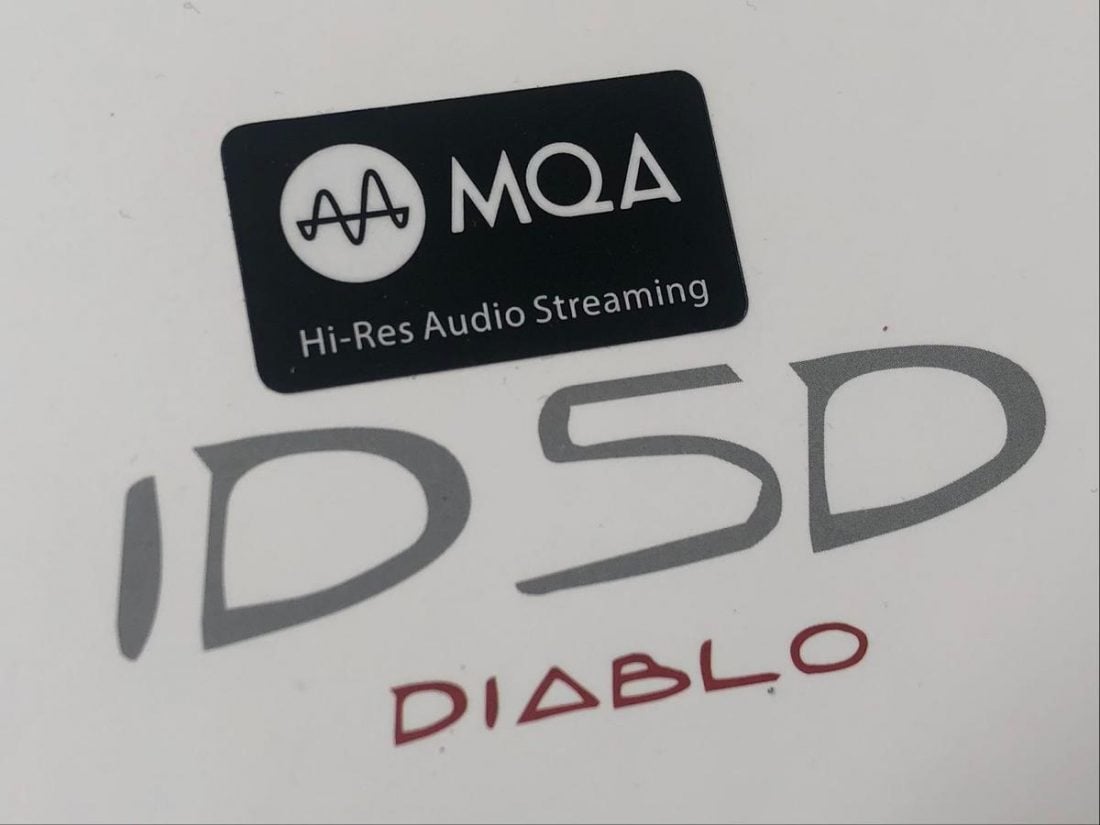
MQA Promises
Far smaller file sizes, with better than original sound quality. MQA encoded files will play back on any device to deliver higher than CD quality. That’s a big part of the MQA promise.
Scientific objectivists and audio subjectivists are often at odds within the audio hobby. MQA is an ideal new topic to further widen the divide.
MQA dismisses any lossy codec concerns because “MQA is a philosophy more than it is ‘just a codec.’” The sound quality of MQA cannot be compared to other formats, because of their insights gained from human neuroscience, and the importance of their time-domain-focused filtering techniques.
Traditional quality evaluation methods simply do not apply.
The above statement likely requires a trigger warning for objectivists.
MQA further claims to ‘de-blur’ the music and maximize dynamic range clarity through their end-to-end process, which is said to reduce modulation noise errors. Terms like ‘folding’ and ‘de-blurring’ are technical jargon, and concepts like applied-neuroscience, and a time-domain-focused approach to filter design are nigh-on impossible to prove.
And when folks such as GoldenSound attempt to scientifically measure to illustrate issues, MQA can always point to their statements that current measurement protocols do not apply.
For many, MQA has delivered on its promises of superior sound quality. Since its launch, MQA has had no shortage of enthusiastic fans who hear improvements in the music they love after it’s received the MQA treatment.
“…it sounds convincingly better than the normal, non-MQA’d 24bit/96kHz file. Lest you thought MQA was just a way to pack, transmit and then unpack hi-res audio… it isn’t. It’s that. But also more.
An MQA file and its hi-res cousin would sound (close to) identical. But do they? No, they do not. And from an audiophile perspective, the audible differences aren’t subtle… more musically convincing than its hi-res counterpart… The MQA version delivers fuller, more tonally satisfying bass notes and a better sense of the space… MQA seems to do a better job of making the three dimensional illusion that is high end audio playback more believable…
In more general terms, and depending on the musical content, MQA draws player outlines with greater clarity and fleshier tonality. More easily ‘seen’ is each player’s soundstage positioning. Decay, from percussive ticks to guitar licks, becomes more obvious too…” – John Darko – An Inconvenient Truth: MQA Sounds Better – June 1, 2016
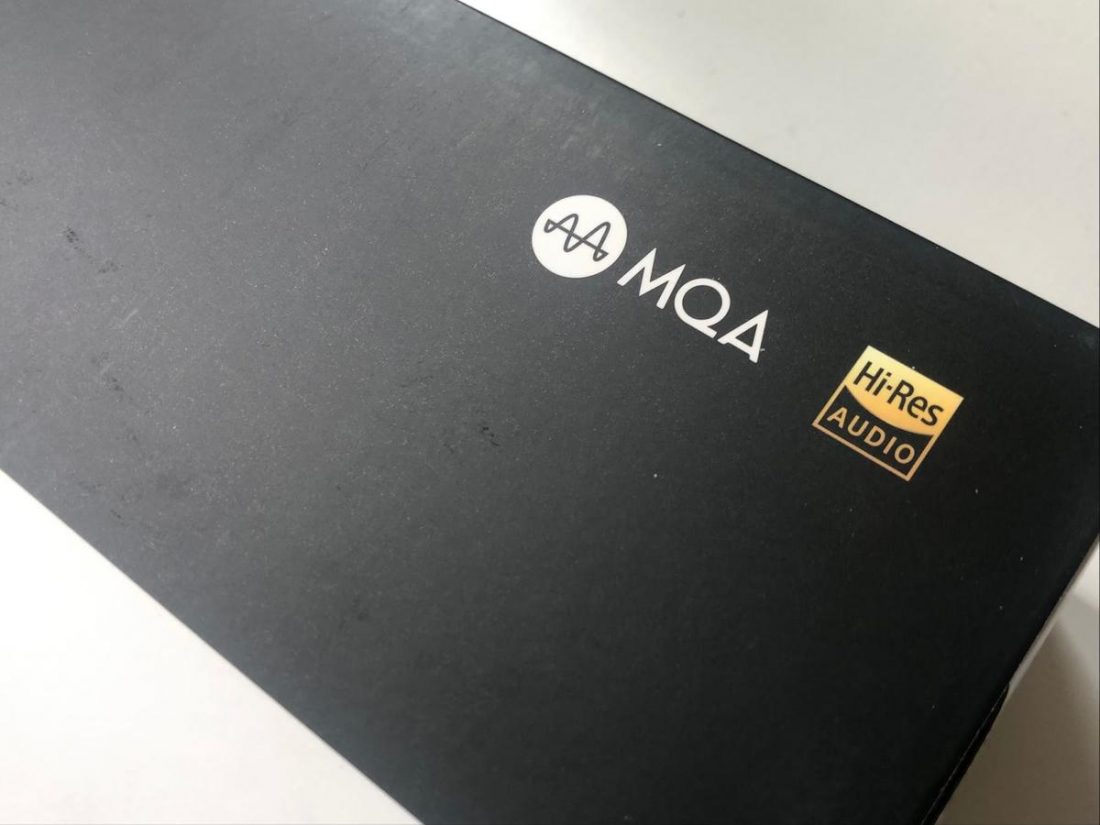
Critical Responses
After such a glowing review above (circa 2016), the ongoing debate and time seem to have tempered John Darko’s feelings regarding MQA. Referencing the GoldenSound video, he recently (April 30, 2021) summarized his current concerns with MQA.
“…the points of friction for MQA are beginning to pile up…
- its theoretical complexity,
- its hardware requirements,
- that hardware’s software requirements (especially with Android devices),
- the specialist terminology (‘renderer’, ‘decoder’, ‘core decoder’),
- an MQA DAC’s authentication lights,
- ‘white glove’ MQA vs. batch-processed MQA,
- its proprietary nature,
- its marginal audible improvements over lossless/CD-quality audio with all but high-end audio hardware,
- the even more marginal improvements of an MQA file played via a non-MQA DAC in anything but a high-end audio system
- the nature of the hi-fi discussion surrounding MQA that all too often sees small-but-vocal sections of the hifi community transmogrify soberly presented technical concerns** into an hysterical game of personal politics…

Concerns Raised by the GoldenSound Video
The GoldenSound video is entitled “I published music on TIDAL to test MQA – MQA Review.” It documents an attempt to circumvent the current MQA testing limitations. GoldenSound pulled no punches and boldly stated that they are “providing evidence that MQA’s claims are not true”.
The main concerns in the video may be summarized as:
- MQA is not lossless regardless of the original sample rate
- MQA adds unwanted noise and distortion
- MQA is not usually sourced from a high sample rate master
- The MQA ‘authentication’ indicator does not authenticate/guarantee anything
MQA claims that it “unlocks every detail of the original master recording” and “wherever audio exists, MQA ensures it’s the best it can possibly be.”
However, based on the results demonstrated in the video, these claims are shown to be false. As discussed, if there is ultrasonic content present in the original master, the MQA encoding process aliases this content down below the noise floor. However, GoldenSound demonstrated that unwanted noise penetrated into the audible band.
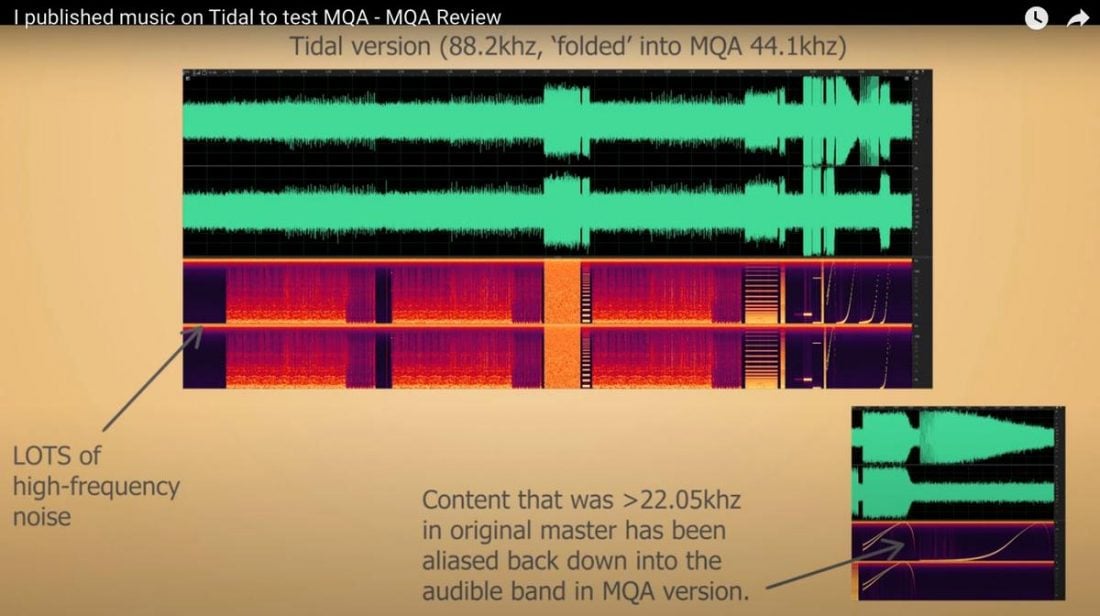
The high-frequency information is added back to the file, but imperfectly, and with audible distortion, artifacts, and limited dynamic range. It does not maintain 100% of the original recording, regardless of the sample rate of the original file.
Beyond the MQA encoding process adding unwanted noise to the file, the MQA playback filter has poor attenuation. Critics describe it as a ‘leaky’ filter. From the video, persistent high frequency noise may be seen in the audible band, the square wave has excessive overshoot, non-linear ringing, and the transitions are notched.
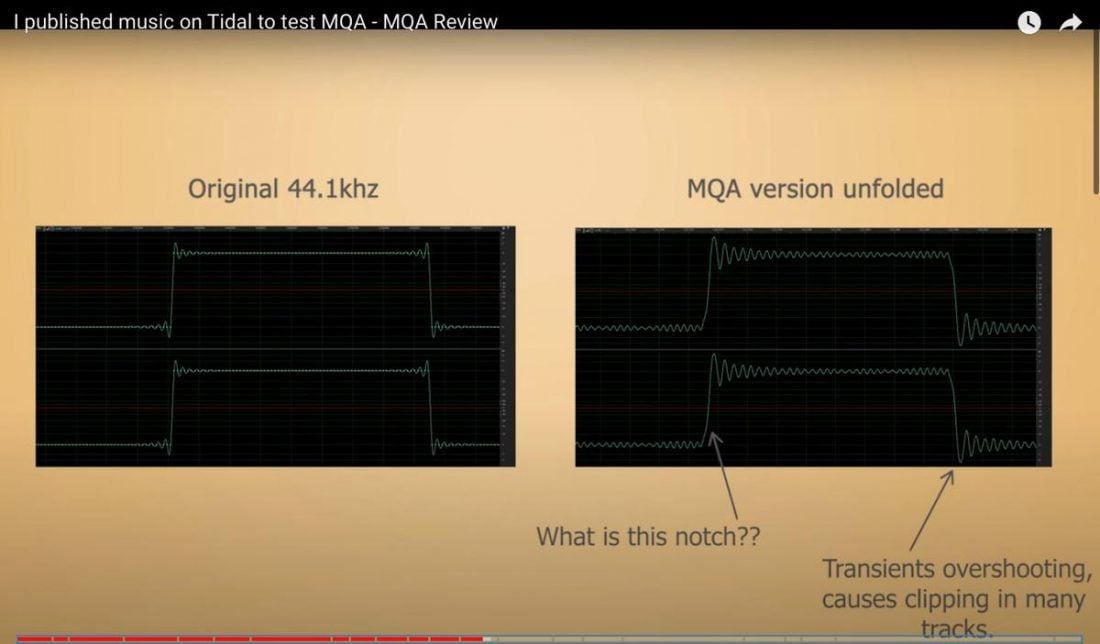
The MQA minimum phase filter design creates phase anomalies, especially with higher frequencies, and introduces temporal distortion and noise. Critics state that the MQA filter is almost certainly sonically inferior to standard playback filters for playing back standard PCM files. As such it is undesirable as the only filter option in a DAC.
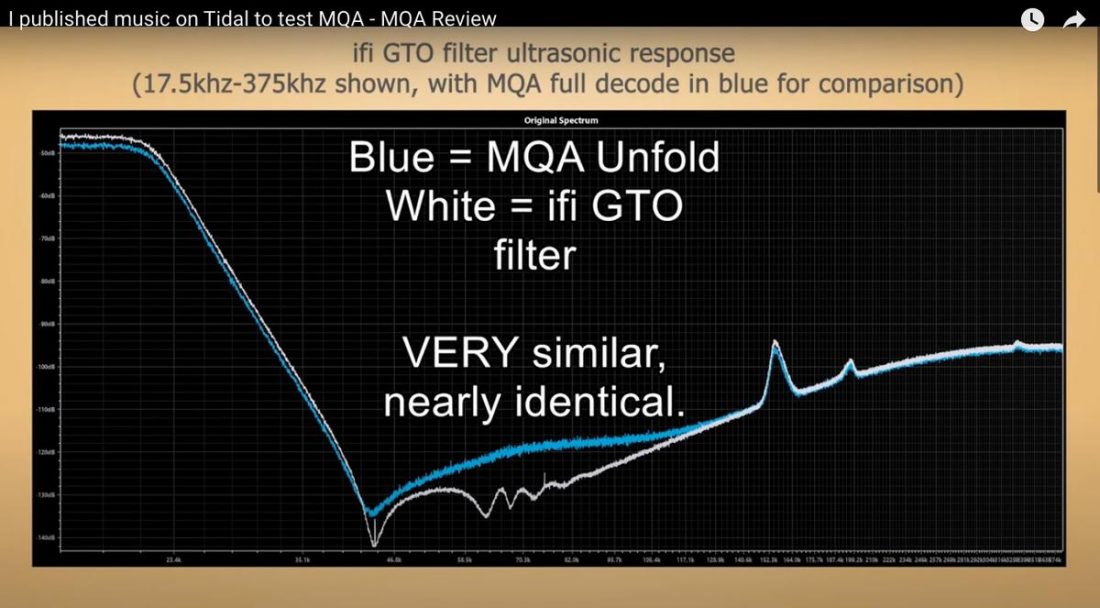
MQA Resolution
Most MQA releases on TIDAL are from a 44.1kHz master and not a high-resolution file. TIDAL does not indicate the sample rate of the original file (but Roon does within the track description).
The MQA indicator is the same whether the original file is high-resolution or if it is just an upsampled 44.1kHz standard resolution file. By not clearly displaying the original sample rate, this misleads consumers into believing all MQA releases are the same or better than 24bit/192kHz.
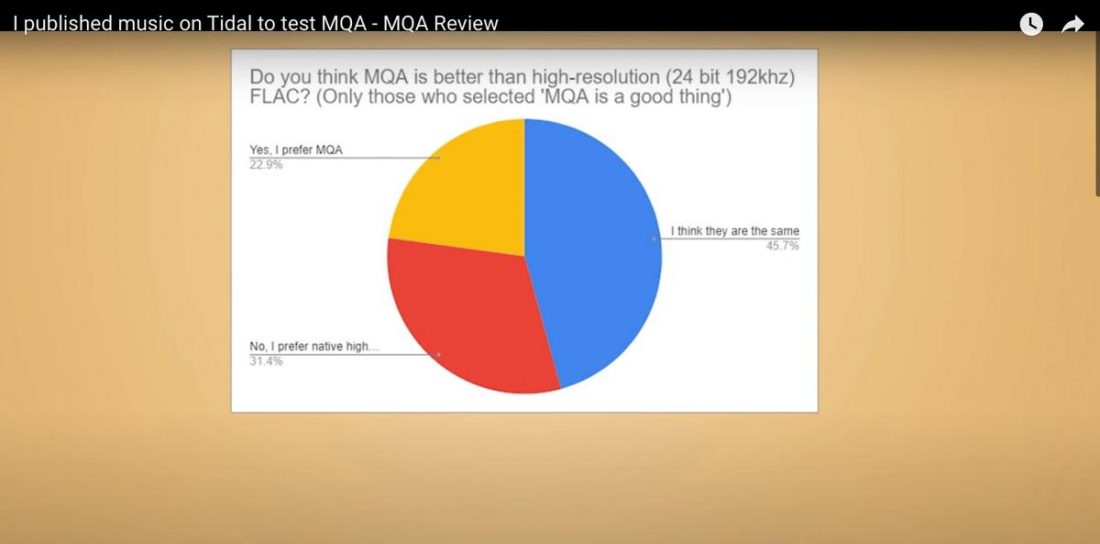
Artists such as Neil Young have publicly denounced MQA’s conversion of his music and he pulled his catalog from the service after they converted his standard resolution files to MQA.
MQA Assurance Indicator
MQA claims that the “studio” indicator (MQA blue light) gives confirmation directly from the mastering engineers, producers, or artists to their listeners that the sound they are hearing is exactly as originally intended and recorded.
However, the video notes that without proper indication and notification, the end-user can not trust the quality of the file they are receiving. Other testers have removed up to 30% of the file data and the blue light still functions. MQA’s response is that “…the onus is on the submitter to check the content when it arrives in TIDAL and confirm the sound.”
Lack of Transparency
Another concern raised in the video is MQA’s lack of transparency and aversion to third-party testing. Examples such as Chord Electronics and DSD provide measurements and evidence to the consumer to make informed decisions. Unfortunately with MQA, no end-to-end evaluation tools are available.
Rather they actively discourage testing. End users can not encode files in MQA (they must be uploaded to TIDAL) or record the final output of a Full Decoder device. Testers have to find ways around the roadblocks (as the GoldenSound video attempted to do).
Control of the Audio Market
It’s important to note that the MQA format is proprietary and that the MQA company stands to benefit the most if the format catches on and replaces other high-resolution audio options. The danger is clear if MQA eliminates other hi-res formats and the audio quality concerns are valid.
Less choice, and the resultant monopolies, seldom benefit the consumer.
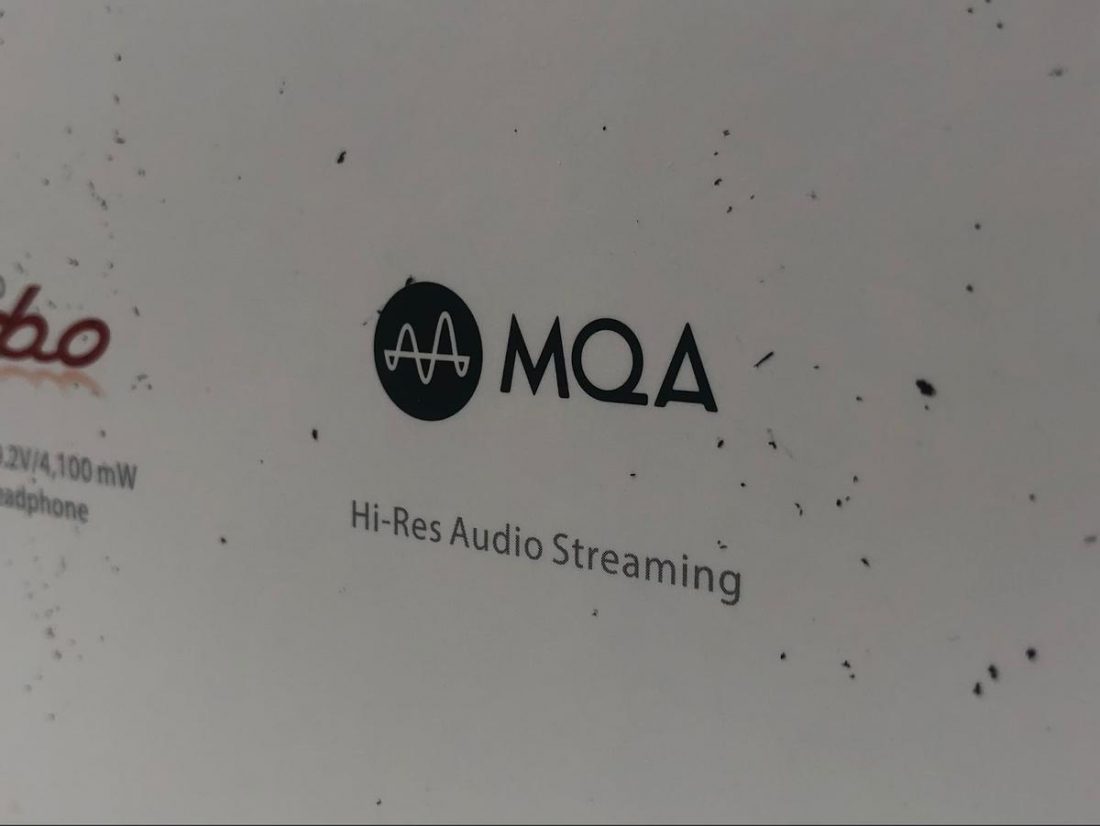
MQA’s marketing has been very successful; consumer brand recognition and demand are very high. Regardless of their personal feelings on the subject, hardware manufacturers must decide if they want to implement MQA into their products (and pay the licensing costs), or potentially lose sales.
It’s a simple business decision, without MQA certification, they stand to lose customers and sales. Companies such as PS Audio, Linn Products, and Schiit Audio have taken vocal stances against MQA due to the licensing requirements, although PS Audio does offer MQA certified devices.
Conclusion
With all this uncertainty, it’s no wonder that MQA is a controversial topic.
- MQA is a company that stands to gain financially by their proprietary format increasing in popularity
- MQA is a new approach to digital audio file compression designed to reduce the file size for streaming and distribution
- MQA claims to offer the highest available sound quality and to authenticate the quality and end-to-end delivery process
- MQA claims their neuroscience-based, time-focused filter techniques can not be measured by current methodologies
- MQA actively discourages measurement or comparison of their format
- Critics have attempted to measure MQA and have noted audible quality degradation in contrast to MQA’s claims of ‘nothing is lost from the original’
- Critics note that the MQA blue light authentication does not guarantee the integrity of the audio file
- The original file format is not clearly displayed during playback and implies a high-resolution source regardless of the original sample rate
- Critics claim that the MQA (and similar iFi GTO) filter are leaky and offer worse performance for standard PCM playback
- If MQA becomes the dominant hi-res audio format, not only may it be sonically compromised, it is not open-source, thus requiring hardware and licensing fees, and has DRM like controls built-in
I’m typically a live-and-let-live kind of guy. Do you want to listen to low-bitrate mp3s on components connected only with rhodium cables? Fill your boots. It’s all about enjoying the music. I’m usually a firm believer that all that’s important is that it sounds good to you.
Why should anyone care if other folks like the sound of MQA? “Mind your own business,” as many a mom would say.
The MQA debate isn’t quite that simple.
If you are to believe the doomsayers, MQA threatens to change the future of high-resolution audio. What happens if the industry significantly moves away from the relative purity offered by the open-source FLAC format, and embraces MQA as a replacement? Could studios forsake mastering in hi-res and MQA become the de facto standard?
In truth, this is likely just the worst-case theory of a small but vocal group of detractors. Yet, should MQA establish dominance over the hi-res audio market, it likely isn’t a good thing for consumers. Firstly, MQA is a single company’s intellectual property, and not free for use. Secondly, it really might not sound as good as what we’ve currently got.
Consumers stand to lose freedom of choice, gain hardware purchase requirements, and no longer have access to original hi-res audio files.
On the other hand, MQA supporters fervently maintain that MQA delivers on its promises. They affirm that the measurements do not tell the whole story. To their ears, the sonic improvements go far beyond what the numbers imply.
Who’s right? Is MQA the next great advancement in high-resolution audio, or is it merely smoke-and-mirrors marketing for one company’s proprietary take on compressed music distribution? Both sides of the argument are prone to going too far. Like most things, after we look closely at both sides of an issue, the truth usually lies somewhere in between the extremes.
You need to make your own mind up regarding MQA, but as a fellow music lover, you likely shouldn’t ignore it.
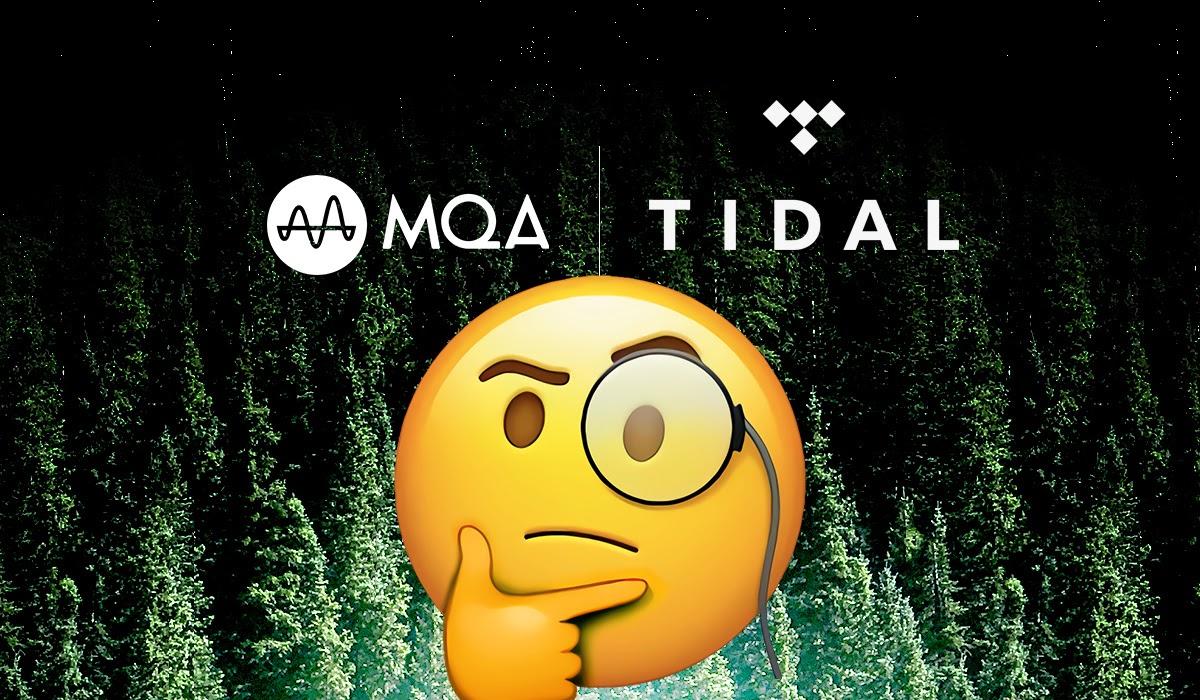
3-step decoding process,
(88.2 → 176.4 → 352.6, or 96 → 192)
think it should be
88.2 → 176.4 → 352.8
To understand MQA see the following:
https://www.aes.org/e-lib/browse.cfm?elib=17501
In it, you will find a triangle that contains the audibly relevant information in the recordings. MQA is simply a lossy method of preserving the pertinent audible details in the triangle and not worrying if the inaudible information is lost. It is done in such a way that time smear, which is why hi-res recordings sound better, is kept to a maximum of 10ms. It is all the ear can resolve. The Golden Sound Guys deliberately made MQA files with information outside the triangle that ‘broke’ the MQA process. But they rarely, if ever, occur in actual studio material, so their concerns are a non-issue in practice. The principles of what MQA is doing are well known. The exact details are not. The real issue is MQA has made false claims that it is lossless. It is not – however it is lossless as far as information in the triangle is concerned except for one minor point. It does introduce a slow roll-off filter above 20khz that, since it is above 20kz, is inaudible. Does it sound better? I think it does, but others do not. In the end, only you can be the judge.
Bill, thanks for giving us more insight in this MQA conversation. Much appreciated.
You probably mean 10us (microseconds), which is about what 96kHz resolves. I call BS though: in 10us, sound travels only about 3mm, so you’ll get a way larger “time smear” between your left and right speaker in any typical situation. From that paper it seems that MQA boils down to taking some of the ultrasonic content and folding it down into the least significant bits of the low-frequency content. This is done in a smart way so that (after ‘decoding’) it only affects the dynamic range of the relatively high frequencies (above 10kHz or so) which typically don’t contain that much information anyway.
Still, the upshot is that you end up (very slightly) degrading some of the audible signal just so you can cram some ultrasonic content in it. In the process you’ve conveniently produced a noticeably degraded audio stream that one needs to pay royalties for to have the privilege of decoding it to the only slightly degraded one…
All of my recordings stored on a QNAP are at least WAV format and some are 96/24, because the cost of data storage has fallen allowing Joe Public to afford such quality files, all this talk of squashing data to get better transmission levels will eventually become redundant, look at Flac and MP3 neither are as good as CD or WAV files. Let alone DSD files.
The internet will eventually be able to send WAV quality files to our storage, it won’t happen this year or next but it wil come.
A compressed file is exactly that, compressed.
Many claim that Flac is as good as WAV and I for one disagree.
Um…. FLAC is data in, and *exactly* the same data, bit-for-bit, out. The WAV in is identical in every respect to the WAV out. All FLAC does is ‘zip’ more optimally for music files (size and randomness) than ZIP.
Flac can recreate the exact bitstream of a wav file, literally no difference, identical… I’m not sure why he thinks it’s not, it can be proven by measurement and science!
So we know you should not be listened to. Because fact is flac is the same as the wav. You should do some homework.
I wasn’t mentally slotting this article into the complete BS compartment, I have an open mind, until I came across this part:
‘ ****MQA Promises****
Far smaller file sizes, with better than original sound quality.’
You might as well tell me that your television has a picture that’s better than the real thing.
Please don’t cherry-pick.
Full paragraph:
Far smaller file sizes, with better than original sound quality. MQA encoded files will play back on any device to deliver higher than CD quality. That’s a big part of the MQA promise.
Compare apples to apples. CD quality into MQA, demonstrably and measurably lower than CD-quality out.
192k/24/s in, ‘better’ than CD audio quality out ‘maybe’ (but still with visible and possibly audible encoding artitacts), and again meaurably and audibly not the same that the original input quality. And for older analogue sources CD is likely already better than most.
The ‘MQA promise’ is obfuscating, for those who don’t know better.
No one is arguing whether the MQA promises are correct. We are quoting what MQA is promising to the users which is what the entire section about.
You’re so right, I shouldn’t cherry pick.
I should have added a comment on the next sentence.
‘MQA encoded files will play back on any device to deliver higher than CD quality’ Clearly NOT any device and clearly NOT necessarily higher than CD quality.
I’m not, incidentally, poo-pooing the concept of of MQA. What I am saying is don’t make objective statements that are clearly incorrect. If you tell me that from a subjective point of view a MQA file sounds better than a CD then I could only deny that point of view by making the same subjective comparison.
This is a psyco-acoustic solution, it may sound better, perhaps, but from an objective, metric point of view it’s not up to scratch.
Just checking to see if you’ve learnt to read this year, good luck mate!
Pay attention to the “triangle” part. You don’t need parts that you can’t hear!
Am I feeding the troll here…?
FLAC output, or any lossless compression format for that matter, is identical to the source material. Bit for bit. As another commenter put it, it’s just like a ZIP-compressed WAV file.
You’re entitled to “disagree”, but that puts you in the same group as those who disagree that 2=2. That’s fine if you like your audio philosophically encoded rather than scientifically.
For me the SACD Isos are the only format near the masters……..only the size in them are big……
Anything process where the linear PCM output presented to the D/A differs from the linear PCM used as the source media, is flawed.
Similarly with the analogue output waveform of, say, MQA versus that of CD or higher-resolution. Linear PCM is the definitive digital representation.
Not necessarily – it depends on the ambition. Presumably the best objective would be the analogue output is most like the analogue input – so your statement is true only if the adc and dac cycle add nothing to the cycle. MQA claim that the a>d>a cycle does add audio effects and these can be minimised through the MQA process. It would make sense then to judge MQA at the analogue level.
Yeah, well they do the AD and DA , with a whole lot of other junk stuck in between !
Anything that sounds different in any way to the 96K/24 test file is inherently flawed.
And for most music recorded in the last 3 decades, chances are the master was digital (or initially recorded digitally) in the first place !
It’s proprietary, that’s all you need to know. Even if the sound quality is better than 24-bit 96khz, for example, any music lover should ignore it and watch the open-source space.
Proprietary formats add to the cost of consuming music and no part of those additional costs finds it’s way to the artists or producers.
After reading through all of the comments above I realised that there is hardly any mention is how the sound feels. I am always telling my audiophile friend to stop listening to his cartridge, his turntable, his amp speakers etc, and to listen to himself – how does the music make him feel, does it “groove” him, does it make his bones want to dance. I’ve just spent an hour, or so, flicking between my downloaded 96-24 copy of Rod Stwert’s Foot Loose and Fancy Free-You Keep Me Hanging On and Tidel’s Master MQA file. On the first few listens, checking bits of guitar-vocals-organ etc, I was in favour of the MQA file however is wasn’t until the playout where the strings come in that I noticed the difference, the strings on the 96-24 file sounded\felt sweeter. I felt that the MQA file was “sprinkled with magic sparkle dust”, although I do have to admit that they do sound fast and exciting – The big “so” at the end of the day you don’t have to analize all the tech data, just listen and enjoy.
‘How it feels’ is irrelevant when demonstrable hard evidence suggests that one is in any way different to the original. The original digital spec, or an up-sampled copy, is the definitive standard. And if MQA ‘feels’ any different, then that is a fail.
Mind you, some people lilke the ‘feel’ of vinyl, which is demonstrably inferior in every way. So much for feel v. fidelity.
.
Never did get the vinyl thing, it is to me a much worse end product/sound. That said, I have been listing to Tidal MQA Studio blue and MQA green through iFi Hip-dac2 over 50 hours now on a few different headphones & iem’s both unbalanced and balance 4.4mm and I find it better than my flac or the same.
The digital copy is not what MQA is going for and by definition will NOT be the same. It can’t correct for the anti-aliasing artifacts of the ADC and still give a bit for bit copy of the original. It is not a compression codec!
MQA’s goal is not to reproduce your flac. It’s to reproduce the analog. Comparing to the flac just tells me you have no clue what the goal of MQA is. MQA is based on the idea that your flac is PCM and therefore flawed.
I what you say were true, they should re-record every piece of music in the studios using MQA. What was produced previously with existing methods is according to your statement already flawed.
It is marked driven.
I and many other will enjoy tidal master with mqa until there is a good enough alternative with widespread hardware and software support. Amazon music is not available in my country and is not supported on devices like Nvidia shield.
Just as surely as the eye-brain connection can be fooled, so can the ear-brain connection be fooled.. In affect, MQA is perhaps defining for some people what good enough is. Remember in the beginning digital was touted as being superior to analog and yet we know early digital suffered from digititis. Yet there were people who said it was better than the best of what analog had to offer.
Um, yes. That is because it did and does. Despite some slightly glary first gen D-A and questionable transcriptions, it was/is still closer to the master than any consumer analogue media could ever be.
… That was referring to ‘digital’, as in LPCM or DSD either native or in FLAC or ALAC (or similar) form . But *not* MP3 , AAC, MQA, etc. Though some data-reduced formats may potentially sound closer to the master than the likes of vinyl.
… that was referring to the assertion re ‘digital’, as in LPCM or DSD be it in a WAV, FLAC, ALAC or other lossless format. Not referring to digital as in data-reduced formats such as MP3, AAC. MQA, etc. Though some may sound closer to the master than the likes of vinyl …
I feel as though the best solution here would be to file lawsuits against MQA for defrauding the audio community. It could easily be a class action which would include anyone who has ever used MQA or signed up for any of the services which serve MQA files. If you want companies to stop abusing you, you have to hit them in their pocketbook. And the best way to do this, especially when there is so much evidence against them, is to simply file a lawsuit.
“its marginal audible improvements over lossless/CD-quality audio with all but high-end audio hardware,”
— Seems an invalid criticism. Why should anyone expect to hear audiophile quality on low or midrange gear?
You’ll have to take that up with John Darko. ;). I see your point though.
More to the point – how is it POSSIBLE to improve on lossless, is lossless is inherently 100% perfect.
Improve in lossless?
Lossless 16 bit 44.1Khz is no loss compared to CD. But against a 24 bit, 192Khz master, its lost a lot!
If you want more depth and/or sample rate, then you need to encode the master. Encoding the master to Flac isn’t good enough. High bitrates really don’t solve anything.
CD can’t do it at all! Higher sample rates will give you frequencies you can’t hear and possibly better imaging due to time resolution, but both the CD and any other digital master has gone through an ADC and that means an anti-alias filter HAD to be used! This filter damages phase in the higher frequencies. These high frequencies are normally harmonics of the original, so when playing the fundamental and harmonic together, they are no longer in phase and this causes phase distortion and time smearing. Your ears have trouble placing the sound because the frequencies don’t line up anymore! The magic imaging and warmth of vinyl through tubes is ripped apart!
MQA is basically taking an impulse response of the ADC and setting up a reverse filter to fix the phase distortions.
Lossy? Not really. Its not the same as your FLAC of the PCM data, but MQA is trying to restore the analog, not the digital. The PCM is not the goal. The analog is. Lossy compression of frequencies I can’t hear are of no concern! That phase consistency is the goal! You would need to compare to the original session recordings (hopefully they are analog) to get a comparison base. Comparing to digital PCM is totally pointless.
Finally someone who nailed it. Any debate should be on “to what degree does MQA fix phase distortion?” It’s the huge elephant in the room that to me, unfortunately, invalidates the whole thread and audiophile community… where is the GoldenSound or real audiophile out there setting up a little rig to test for that via a 768k sampled digital reference that can then be used to generate raw data on phase distortion.
These people like Geoff can’t seem to get it out of their head that ADC is lossy and the only thing “loss-less” about a digital format is in the STORAGE of it, TRANSPORT of it, and hypothetically first digital phase of the DAC if and only if under a clock synch of utter unreachable perfection.
ALL OTHER PHASES of lossless digital are in fact LOSSY so could be open to the same disgruntled protests of “you lied about lossless!” as they are making about MQA. As explained here over and over and PEOPLE.JUST.DON’T.GET.IT.
TLDR: ALL analogue to digital recording is LOSSY. ALL digital to analogue transduction is LOSSY. ALL MASTERS ARE LOSSY. QED. Methods of D-to-A that can algorithmically fix these lossy issues during the transduction phase should be EMBRACED, with a caveat that verification and progress in this area are retarded by proprietary inscrutability.
>>>> All arguments about MQA should stay in their lane: (1) analysis of phase distortion improvement and (2) scientific progress requiring more openly available and testable data.
Cool but how do you know all of that? How can you prove that to me? Show me the source code that does this. Oh wait…
Improve in which dimension? Indeed it won’t improve from a fidelity standpoint, but in terms of transport and storage, it could be a positive. That said, there is a certain whiff in the air on this one. I recall working at a major software company back in the 80’s when a charlatan(engineering side)/wunderkin(mgmt side) presented a talk on his new data compression algorithm. He had been touting that he was able to compress data files over 99% reducing a megabyte of data down to under a Kb. And of course his demo achieved this. Needless to say, we technical folks, being more than somewhat skeptical challenged him on this and demanded to compare the decompressed result to the original. When pressed, he exclaimed that while the compression side had been perfected, he was had yet to get the decompression to work properly. We called BS of course and after a few months he was out thankfully out of the build and back on the street where he belonged. But then back in those days, there was some scruples about selling stuff that actually worked. Not sure we’re in the same place today.
Not all that import for people who stream Tidal Masters. A large percentage of Tidal Masters recordings are CD quality enfolded into MQA. Now I do not care that people overpay for the same high definition content that is on Amazon Music. MQA does degrade the sound of a recording. Where it start is that the normal range of human hearing is actually 20 hertz to 10,000 hertz. Hearing tests by audiologists actually measure from 20 hertz to 8,000 hertz. Anything above 10,000 hertz is actually unpleasant. MQA enfolding and unfolding lowers supersonic frequencies into audible frequencies. If you spend enough time in Tidal Masters with a good DAC you will hear recordings that do sound worse than Amazon Music.
I have a very good system. I have spent the time to locate the speakers to get a great soundstage. I have sound insulated the walls. I listen to music about 5 hours a day while I work. Ultimately all that matters is how it sounds. To my ears, MQA sounds noticeably better than non-MQA. The best way I can describe it is visually, it is like turning up the contrast a bit in photoshop, making the image more vivid. The music is noticeable more “vivid”. The soundstage is more defined. Is it more accurate? I don’t know or care…. the accuracy argument is ridiculous in my opinion … every part of listening to music “flavors” the sound in some way from DAC to amp to speakers. My system sounds great without MQA processing, it sounds even better with MQA processing. At least to my ears 🙂 …
Colour me skeptical. Unfortunately it’s difficult for the audio consumer to conduct a series of double-blind tests to conclusively demonstrate a preference for MQA encoding over the PCM or DSD lossless versions of the same recording (with the same mastering and engineering). Once we’re in the realm of subjective, there are too many factors influencing a consumer’s opinion. Everything from the marketing message to justifying spending more than one can afford in the pursuit of better sound. Testimonials don’t mean much without some objective criteria to accompany them.
I agree with you. I have Schiit Audio Saga S receiver, two Vidars bridged in mono through and an Ifi Zen One Signature DAC that can do the full decoding of MQA feeding a pair of JPL S590 speakers and the MQA tracks are much cleaner and more detailed at the extremes (highs and lows). More detail on the cymbals and bass is cleaner and more detailed. The Hires tracks from Qobuz and Amazon HD sound rolled off at the audio extremes. Since I started listening to MQA files it’s tough for me to stop. They are definitely better than non-MQA files. People will call it snake oil but it’s not. To my ears anyway.
snake oil scam … basically …
FLAC is already good enough, so, all that MQA is trying to do, is monetize FLAC …
luckily, most MQA capable devices are not too overpriced and the subscription for the “base unfold” is not forced …
also the size argument is … odd … (MQA are not that smaller from a FLAC)
sound argument is … nah, i tested (Fiio KA1 MQA X16 capable Fiio audio player with MQA subscription and planar magnetic headphones, wired ofc)… to me it sounded way worse in MQA (Tidal) than in FLAC (Qobuz/locally )
in the end, MQA drove me away from Tidal and made me switch to Qobuz
To all the comments bet it beats all. Who Cares? You either enjoy it or you don’t. Subjective to a person’s own taste. I will deal with my own taste, and I enjoy Tidal.